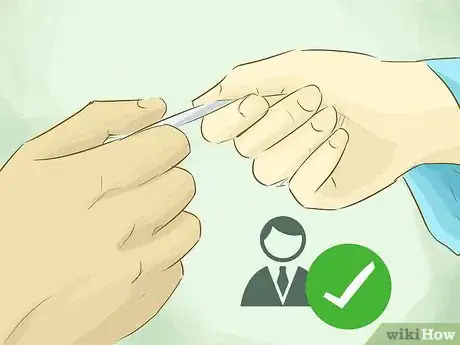This article was co-authored by Clinton M. Sandvick, JD, PhD. Clinton M. Sandvick worked as a civil litigator in California for over 7 years. He received his JD from the University of Wisconsin-Madison in 1998 and his PhD in American History from the University of Oregon in 2013.
There are 8 references cited in this article, which can be found at the bottom of the page.
This article has been viewed 27,551 times.
An “accessory after the fact” is someone who helps a criminal hide from police.[1] You can be charged as an accessory if you aid or abet your family member with an active warrant in any way. To avoid illegally helping your family member, you should cut off contact and work with the police. The best thing you can do for your family member is to help them get a qualified criminal defense attorney.
Steps
Avoiding Aiding and Abetting
-
1Avoid hiding your family member. You act as an accessory after the fact when you hide a family member after they commit a crime.[2] If you know he or she has an active warrant, then you shouldn't let the person into your home.
- “Hiding” doesn't mean you have to drive a family member to an isolated location to hide them. Simply letting a family member on an active warrant crash at your place can count as “hiding.” You can't let your family member live with you if they have an active warrant.[3]
-
2Refuse to handle stolen goods. You are also aiding and abetting your family member when you hide stolen goods.[4] Whenever a family member gives you something to store, you should always ask what it is and how they got it.
- If your family member can't tell you where the goods came from, then you should say, “I'm sorry, I don't have the room” or “I don't think I can keep that safe.”
Advertisement -
3Decline to hide weapons or anything used in a crime. It is also illegal to destroy any evidence of the crime, such as weapons or communications.[5] For example, if your family member committed a financial crime, then deleting computer spreadsheets or altering records is considered “obstruction of justice,” which is like aiding and abetting.
-
4Avoid giving your family member money. If your family member has an active warrant, then you shouldn't give him or her money. Money can be spent on anything and can be used to buy a bus ticket out of town.
- You also shouldn't lend them property. Don't let a family member with an active warrant borrow your car.
- Instead of giving money, you should encourage your family member to go to the police and surrender. This may be difficult for you to do. Nevertheless, your family member faces a lifetime of running from the police if they don't turn themselves in. It is better to face the consequences directly.
-
5Don't share information with your family member. You also aid and abet a family member if you give them information that will help them escape. For example, if your child is on the run, then you aid and abet them by calling them and telling them where the police are looking.
- You should avoid any contact with a family member who has an active arrest warrant. If they call, tell them to turn themselves in.
-
6Tell the truth to the police. Lying to the police is also a form of aiding and abetting. If the police contact you, then you should always be truthful. Tell the police where your family member is (if you know) and share any information about the crime that you have.[6]
Finding a Lawyer for Your Family Member
-
1Get referrals for a criminal defense attorney. Instead of helping your family member run from the law, you should help him or her get a qualified attorney who can help build a defense.[7] You can begin by getting referrals to a qualified criminal defense attorney. You can get referrals from the following sources:
- Phone book. Ads in the phone book should point out if the lawyer does criminal defense work.
- Other attorneys. They are a great source of referrals. If you used an attorney to buy a house, then ask him or her for a referral to a criminal defense attorney.
- People you know. Some people won't admit that they have used a criminal defense attorney in the past. However, if you know someone has used a defense attorney in the past, you can ask if they would recommend that person.
- Your local or state bar association. Bar associations are organizations made up of attorneys. If you call one, they can give you a referral to one of their members.
-
2Find the money for a lawyer. Attorneys don't work for free, and your family member will need to come up with a considerable amount of money. However, a good lawyer is worth every penny, especially when your family member has been accused of a serious crime. Try to pool all available resources:[8]
- Check your savings accounts.
- Use a credit card.
- Cash out savings bonds or stock.
- Sell possessions that you don't need.
-
3Help your family member request a public defender. If your family member is charged with a crime that could result in prison, then they generally have the right to a public defender. In order to get a public defender, your family member must provide the court with financial information, such as their income and assets. You can help gather this information for your family member.
- Print off bank statements to show how much money your family member has.
- Estimate the value of assets. Assets are anything like jewelry, art, real estate, stocks, bonds, or the cash value in a life insurance policy.[9]
- Gather information about monthly income. You typically have to report income from a job, as well as any retirement or disability income, public assistance, and unemployment compensation.
-
4Share any information requested by the attorney. To help your family member get the best defense possible, you should work closely with the attorney. He or she may reach out to you for information. Try to provide it as promptly as possible.
- Remember that even if you help pay for an attorney, he or she still represents your family member, not you. For this reason, the attorney cannot share confidential information with you.[10]
- However, you should stay in close contact with your family member after they are arrested. They can keep you updated about their case.
Understanding the Consequences of Aiding a Criminal
-
1Identify the elements of acting as an accessory. There are certain conditions (“elements”) you must meet to qualify as an accessory after the fact. Generally, the following elements make you an accessory:[11]
- Someone committed a felony. In this situation, your family member committed a crime, and he or she is called the “principal.”
- You helped aid or hide the principal.
- When you helped the principal, you knew he or she had committed the felony or you knew they had been charged with a felony.
- Your intent for helping the principal was to help them avoid arrest.
-
2Check your state law. In 14 states, family members are protected from punishment if they aid and abet their family members. A few other states provide reduced punishment for family members.[12] However, before you help your family member, you should find out if an exemption applies in your state.
- The easiest way would be to meet for a consultation with a criminal defense attorney. You can ask them if your law punishes aiding and abetting family members.
- You also might do research online. Type “your state” and “aiding and abetting” into your favorite search engine.
- Remember that ignorance of the law is no excuse for breaking it. If your state punishes aiding and abetting, you can't defend yourself by saying, “I thought my state was one of the 14 that protected family members from punishment.” You are expected to know the law.
-
3Understand your possible punishment. In the U.S., federal and many state laws allow people who aid or abet a family member to be punished just as harshly as the family member. This means that if your son committed an armed robbery, you could be punished as if you had committed the arm robbery if you help him avoid capture.[13]
- Accordingly, you could face jail time or be put on probation if you are convicted of aiding and abetting a family member.
- For this reason, it is always safest to encourage family members to turn themselves into the police.
Warnings
- Because knowledge that your family member has been charged with a felony is an element of aiding and abetting, some people might be tempted to help their family member but then claim that they didn't know an active warrant was out for their family member's arrest. However, if you are reading this article, then you certainly know your family member has a warrant. It is in your best interest not to lie to police.⧼thumbs_response⧽
References
- ↑ https://www.lawyers.com/legal-info/criminal/criminal-law-basics/aiding-and-abetting-a-criminal.html
- ↑ https://www.lawyers.com/legal-info/criminal/criminal-law-basics/aiding-and-abetting-a-criminal.html
- ↑ https://www.wklaw.com/can-i-go-to-jail-if-i-let-someone-live-with-me-when-he-has-a-warrant-for-his-arrest-pc-32/
- ↑ https://www.lawyers.com/legal-info/criminal/criminal-law-basics/aiding-and-abetting-a-criminal.html
- ↑ http://stillwatergazette.com/2016/02/02/what-is-aiding-and-abetting-a-crime/
- ↑ https://www.lawyers.com/legal-info/criminal/criminal-law-basics/aiding-and-abetting-a-criminal.html
- ↑ https://www.wklaw.com/can-i-go-to-jail-if-i-let-someone-live-with-me-when-he-has-a-warrant-for-his-arrest-pc-32/
- ↑ https://grandjurytarget.com/2015/07/10/how-to-pay-for-a-white-collar-criminal-defense-lawyer-part-ii/
- ↑ https://publicdefender.mo.gov/wp-content/uploads/2018/06/Application_Services.pdf
- ↑ https://www.michbar.org/file/opinions/ethics/articles/conflictsofinterest.pdf
- ↑ https://www.wklaw.com/can-i-go-to-jail-if-i-let-someone-live-with-me-when-he-has-a-warrant-for-his-arrest-pc-32/
- ↑ http://freakonomics.com/2009/07/13/when-the-fugitive-is-a-family-member-a-guest-post/
- ↑ https://www.lawyers.com/legal-info/criminal/criminal-law-basics/aiding-and-abetting-a-criminal.html








































































